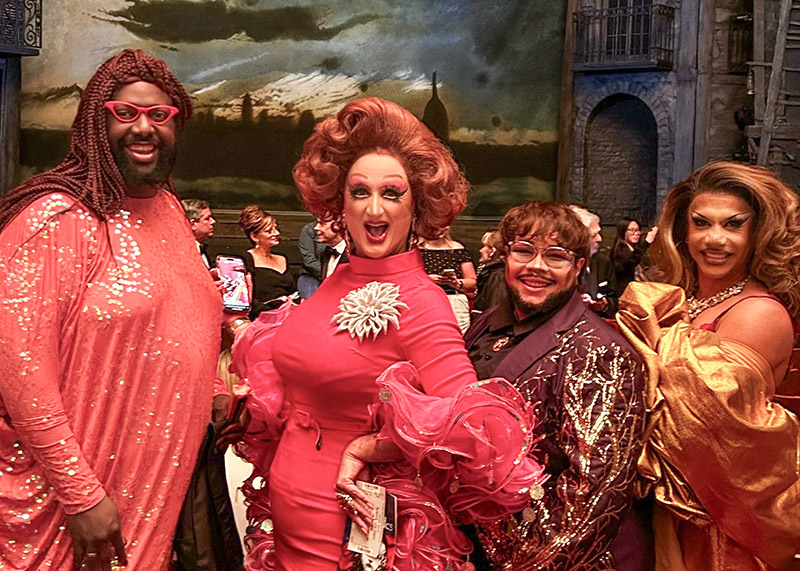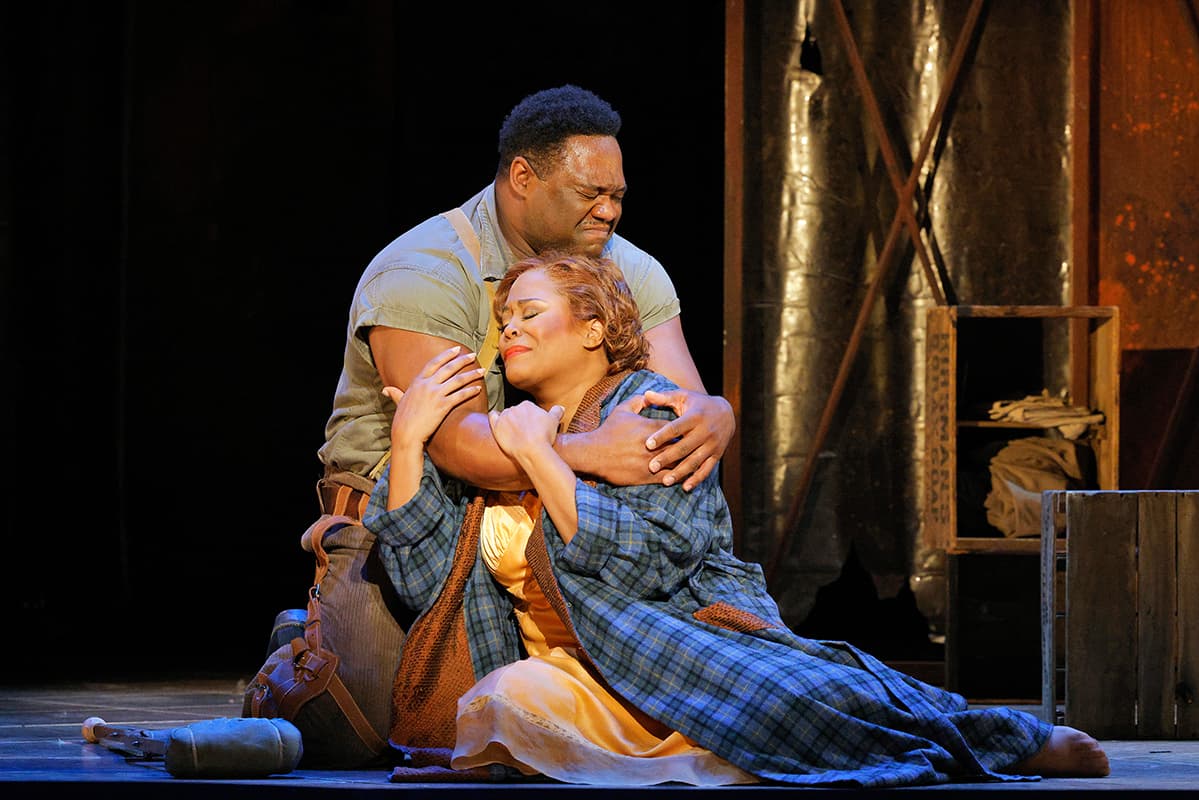Opera review: Faust at the Washington National Opera
An old-fashioned charmer enhanced by an artistic eye, the WNO's Faust gives the Devil his due

As with Eugene Onegin, there is another production that has not seen the velvety-red walls of the Washington National Opera in a couple of decades: Gounod’s Faust (★★★★). Unlike the modern skein of minimalism informing Eugene, this production is happy to embrace — rather than update — an old-world classic. Think of it as a box of chocolates your granny might bring out after dinner: the lid is renaissance pastoral, the confections quaintly flavored for another era’s palate. It may require patience and an abeyance of judgment, but indulging granny and her treat will entertain, delight, and even move the spirit.
Of course, Faust’s story is as pricelessly antiquated as it is accessible: the Devil grants the titular alchemist a wish and, envisioning the curvaceous villager Marguerite, the old goat opts for his youth. Aided and abetted by his demonic wingman, Faust seduces the pious Marguerite, but soon absconds, leaving her to a life of scorned, single motherhood. Returning from battle, her scandalized brother Valentin challenges Faust to a duel, but it doesn’t end well, and curses abound. By the time Faust feels remorse, Marguerite is awaiting execution (for the killing of her baby), and she has gone mad. The lovers part ways for eternity, with Faust heading to Hell and Marguerite ascending into an all-forgiving Light. What’s not to love?
Well, one or two things. First, for those new to opera, as succinct-sounding as the plot may seem, when told through the opera lens, there may be moments when you will question the opera house upholstery and its ability to cushion. Characters agonize, the music lingers. But it pays to remember the pleasure-pain principle of opera (and time with granny): if you can hang in there, there’s usually something good coming around the next bend. In this case, it’s often the Devil.
And director Garnett Bruce makes the most of this Houston Grand Opera production, giving, without fail, something for the eye (as well as the ear) to behold. There are the sets of American artist Earl Staley, who gives his swaths of swirling color, often hiding faces and images, a grandeur evoking William Blake but also evoking the charms of a puppet theater in a distant painted castle, primitive effigies, and giant movable tree boughs. If his gardens look a bit AC Moore and the uneven “stone” steps give the performers pause, it’s a small price to pay. And some of it is even thought-provoking: the Christian mores that break the fragile Marguerite’s spirit are only the most recent to occupy this ancient land.
Other feasts for the eyes are the choral choreographies: they open in a tableau, like some lovely, peasant-populated painting and conduct happy festivals while the protagonists have their dramas. If there is the odd moment of vocal blurring, again, it’s worth it to enjoy their complex maneuvers.
As for the cast, there is much to entertain. Reminiscent of a bemused John Travolta in his dyed-goatee phase, this is a genteel Mephistopheles, the kind of demon who’d rather be liked than loathed, an entity who gets irritated rather than monstrous. If it starts a bit slow, given enough time, Raymond Aceto’s Devil becomes quite fun and charismatic. And with an attractively growly and expressive bass, he makes the most of his long Sparafucile notes (Rigoletto premiered just a few years before Faust).
Keeping in the Hollywood mood, Marcelo Puente plays his Faust with a kind of Mathew McConaughey chewing of the scenery. It works quite well. If he offers perhaps a tad too much vibrato at times and not quite enough “lift” at others, his tenor is nevertheless enjoyable. Does he have chemistry with Erin Wall’s Marguerite? Not a boatload. But Wall is so watchable, it doesn’t matter. Indeed, by turns girlish, pious, and searching, Wall delivers all that’s required: good intentions that are no match for raging hormones. In truth, there isn’t a whole lot to be done with Marguerite’s psychology since Gounod never answers the very interesting questions of why she kills her baby, and whether she went mad and then killed, or the act itself drove her mad.
Singing with much sweetness, albeit with two power notes that feel less controlled, Wall brings enough pathos to make Gounod’s finale — beautifully washed in pale painted clouds by Staley — quite lovely. All that said, costuming needs to take up her hems a few millimeters — she seems on the verge of tripping over them more than a few times.
Other standouts are a quite fabulous and fully-committed Joshua Hopkins as Valentin, acting for Shakespeare and singing with an exciting, fulsome baritone. If his disgust with his sister is bizarre by modern standards, Hopkins sells it through sheer outrage. Also wonderful is Allegra De Vita in the trouser role of Siebel, the young man who longs in vain for Marguerite’s love. De Vita’s mezzo-soprano is as deliciously rich and sweet as dark chocolate and she, thankfully, refuses to overplay her adolescent male. In smaller roles, Deborah Nansteel sings in honey tones and has fun turning the tables on the Great Seducer, while Samson McCrady is convincing and sings ably as Valentin’s countryman.
An old-fashioned charmer enhanced by an artistic eye, this Faust gives the Devil his due.
Faust runs through Saturday, March 30, at the Kennedy Center Opera House. Tickets are $45 to $300. Call 202-467-4600 or visit www.kennedy-center.org.
Support Metro Weekly’s Journalism
These are challenging times for news organizations. And yet it’s crucial we stay active and provide vital resources and information to both our local readers and the world. So won’t you please take a moment and consider supporting Metro Weekly with a membership? For as little as $5 a month, you can help ensure Metro Weekly magazine and MetroWeekly.com remain free, viable resources as we provide the best, most diverse, culturally-resonant LGBTQ coverage in both the D.C. region and around the world. Memberships come with exclusive perks and discounts, your own personal digital delivery of each week’s magazine (and an archive), access to our Member's Lounge when it launches this fall, and exclusive members-only items like Metro Weekly Membership Mugs and Tote Bags! Check out all our membership levels here and please join us today!
































You must be logged in to post a comment.